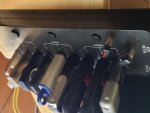AndroGen
Dabbler
- Joined
- Jan 19, 2019
- Messages
- 47
The build comes to the "final" assembly stage, and I am still puzzled in regards to the boot device.
First, what I have understood from other discussions and posts, and would appreciate you validation, whether it has been understood correctly:
Question
Increasing the size of the log files, and the duration they are kept in the system - this would be the only reason to have bigger BOOT drive, otherwise it would be a waste of space.
Do I miss anything?
Any feedback / correction would be appreciated
First, what I have understood from other discussions and posts, and would appreciate you validation, whether it has been understood correctly:
- Boot device can be very small - even 16GB might be sufficient. Some posts refer to 120-250GB SSD, but no posts with 500+GB SSDs
- Logging system resigns on the same drive in /var/log folder, the logging system overrides the logs on regular basis - no high requirements, unless some copying / log preservation mechanisms are activated
- It is recommended to have boot device to be mirrored (redundancy), but this is rather a nice to have for an ordinary system
- Having anything else (e.g. cache) on the boot device is not recommended, as this is not supported by FreeNAS, and will increase the risk of failure during the update/upgrade
- After the boot no high load on the Boot device as most of the stuff is in the memory - hence the SSD speed is not really critical, no need to go for NVMe M.2 devices
Question
Increasing the size of the log files, and the duration they are kept in the system - this would be the only reason to have bigger BOOT drive, otherwise it would be a waste of space.
Do I miss anything?
Any feedback / correction would be appreciated

